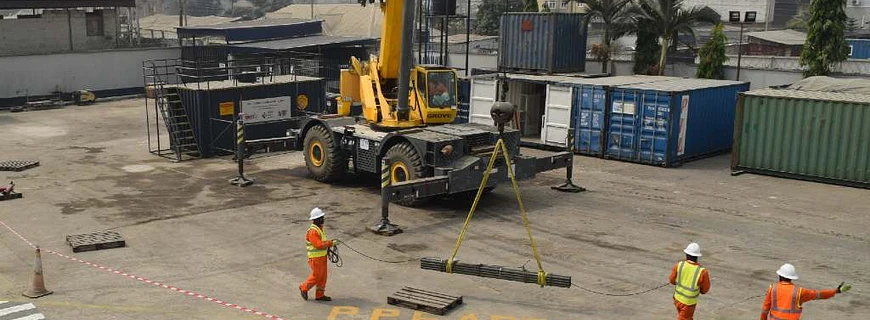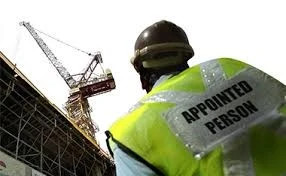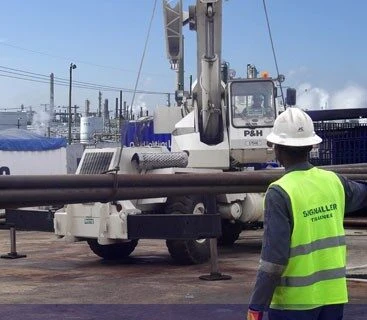LIFTING OPERATIONS TRAINING – HOW TO SUSTAIN COMPETENCY

Lifting Operations Training – How to Sustain Competency
Lifting operation means an operation that involves the lifting and lowering of load. There are several hazards involved in lifting operations which have the potential to cause accidents – from uncontrolled movement of loads and machinery, dropped objects impacting people, assets, and the environment in proximity of the operation. Compliance with Lifting Operations and Lifting Equipment Regulations 1998 LOLER involves proper planning and supervision of Lifting Operations by a ‘Competent Person’. The term Competent Person used in this blog is derived from Regulation 8 of LOLER and different in context to ‘Competent Person’ covered in Regulation 9 of the LOLER. The latter term will be addressed in subsequent blogs.
All personnel required to carry out of lifting operation should be trained, competent and supervised for their respective roles and responsibilities. The level of supervision will depend on the level or complexity in the lifting operation and the risks involved.
Safe lifting operations
The factors that increases the likelihood of planning and executing safe lifting operation includes (but not limited to):
- Working under suspended loads
- Visibility
- Attaching, detaching, and securing loads
- Environment
- Location
- Overturning
- Proximity hazards
- Derating
- Lifting persons
- Overload
- Pre-use checking
- Continuing integrity of the equipment
- Competent lifting supervision and lifting crew

A comprehensive training in lifting operations promotes productivity, reduces damage to your equipment while safeguarding people from harm.
The key roles or responsibilities in lifting operations includes some of the following:
- Banksman
- Slinger
- Crane Operators
- Riggers
- LOLER Competent Person (LCP)
- Appointed Persons (AP)
With regards to conducting Regulation 9 examinations, the following activities would require formal training:
- Lifting Equipment Inspection
- Container Inspection
- Wire Rope Inspection
- Powered Lifting Appliances
- Passenger Lifts
Competency:
According to industry definitions, competence refers to the ability to apply the necessary practical and theoretical knowledge, skills, and personal attributes, for the planning, conducting and supervision of lifting operations. It also applies to the examination of lifting equipment which enables detection of defects and to assess their importance in relation to the safety and the operation of equipment. Gaining competency is a process which starts from initial training which should consider the following:
- Attributes of the individual being trained
- Familiarity with safe systems of work
- Knowledge of personal safety requirements
- Knowledge of codes, standards, and regulations
- Practical skills
- Prior knowledge and familiarity of the equipment or operation being trained on.

Sustaining Competency:
Sustaining competency relies on periodic reassessment which includes re-familiarization with equipment and/or operation and re-training sometimes referred to as refresher. Regular refreshers should be used to maintain training and competence levels and should be monitored and recorded on a regular basis.
The industry has adopted as best practice, the following stages to enable an individual to be deemed competent:
- Stage 1 – Successful completion of an applicable lifting operation training course
- Stage 2 – Recorded and well-defined work experience
- Stage 3 – Successful completion of a competence assessment
- Stage 4 – Periodically refresh training or re-assess competence

Responsibilities of the client / duty holder
There are a few key responsibilities when organizing lifting operations, which all relate to Regulation 8.
Firstly, you (duty holder) are responsible for nominating a ‘Competent Person’ to plan the lifting operations. It is essential, therefore, to ensure that all operations are planned by somebody with the level of capability, knowledge, training and understanding suitable for the complexity of each lifting operation.
Secondly, duty holders are responsible for providing appropriate supervision for the task. By ensuring the person supervising the operation is suitably experienced, they are ensuring compliance with both LOLER and the Health and Safety at Work Act 1974.
Finally, it is the duty holder’s responsibility to ensure that lifting operations are carried out safely. This means thorough initial planning, as well as more specific planning of individual lifting operations, which consider the above factors for ensuring safe lifting operations.
Lifting Operation training is an important part of this process so, it is important to engage the services of a reputable and accredited training provider that can offer training and in all aspects of lifting operations.
At JC International, our lifting operation training courses are accredited nationally and internationally and are performed by experienced and qualified training instructors with sufficient skill and knowledge across the lifting industry.
Our focus is to provide a world-class training services to ensure our clients (duty holders) carry out lifting operations safely whilst demonstrating compliance with national and international regulations.

Leave a Reply